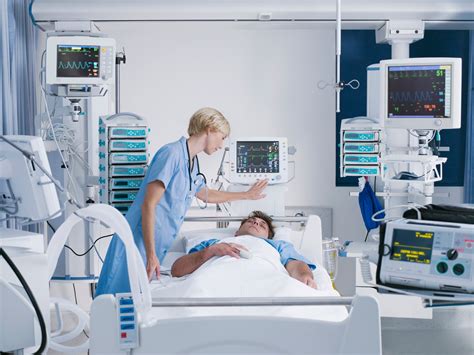The Intensive Care Unit (ICU) is a highly specialized and technologically advanced department within a hospital, where critically ill patients receive close monitoring and life-sustaining interventions. The ICU is a data-intensive environment, where healthcare professionals rely on accurate and timely data to make informed decisions about patient care. The Data Tech Revolution has transformed the way ICUs operate, improving patient outcomes, streamlining clinical workflows, and enhancing the overall quality of care.
Unlocking the Power of Data Analytics in ICU Care
Data analytics has emerged as a game-changer in ICU care, enabling healthcare professionals to extract insights from large datasets and make data-driven decisions. By leveraging advanced analytics tools and techniques, ICUs can identify trends, patterns, and correlations that inform clinical decision-making and drive quality improvement initiatives.

Benefits of Data Analytics in ICU Care
The benefits of data analytics in ICU care are numerous, including:
- Improved patient outcomes: Data analytics helps identify high-risk patients and enables early interventions, reducing mortality rates and improving overall patient outcomes.
- Enhanced clinical decision-making: Data analytics provides healthcare professionals with accurate and timely data, enabling informed decision-making and reducing errors.
- Streamlined clinical workflows: Data analytics automates data collection and analysis, freeing up staff to focus on high-value tasks and improving workflow efficiency.
- Better resource allocation: Data analytics helps optimize resource allocation, reducing waste and improving the overall efficiency of ICU operations.
Artificial Intelligence in ICU Care: A New Frontier
Artificial intelligence (AI) is transforming the way ICUs operate, enabling healthcare professionals to leverage machine learning algorithms and natural language processing to analyze large datasets and make predictions about patient outcomes.

Applications of AI in ICU Care
AI has numerous applications in ICU care, including:
- Predictive analytics: AI algorithms can analyze large datasets to predict patient outcomes, enabling early interventions and improving overall patient care.
- Clinical decision support: AI-powered systems can provide healthcare professionals with real-time clinical decision support, reducing errors and improving patient outcomes.
- Automated data analysis: AI can automate data analysis, freeing up staff to focus on high-value tasks and improving workflow efficiency.
The Internet of Medical Things (IoMT) in ICU Care
The IoMT refers to the network of medical devices and sensors that collect and transmit data in real-time, enabling healthcare professionals to monitor patients remotely and make data-driven decisions.

Benefits of IoMT in ICU Care
The benefits of IoMT in ICU care include:
- Remote patient monitoring: IoMT enables healthcare professionals to monitor patients remotely, reducing the need for bedside visits and improving patient outcomes.
- Real-time data analysis: IoMT provides healthcare professionals with real-time data, enabling timely interventions and improving overall patient care.
- Improved patient safety: IoMT can detect potential safety risks, such as medication errors or falls, and alert healthcare professionals in real-time.
Blockchain Technology in ICU Care
Blockchain technology has the potential to transform the way ICUs manage patient data, enabling secure, decentralized, and interoperable data sharing.

Benefits of Blockchain Technology in ICU Care
The benefits of blockchain technology in ICU care include:
- Secure data sharing: Blockchain technology enables secure and decentralized data sharing, reducing the risk of data breaches and improving patient confidentiality.
- Interoperability: Blockchain technology enables interoperable data sharing, improving communication between healthcare professionals and reducing errors.
- Auditability: Blockchain technology provides a permanent and tamper-proof record of all data transactions, improving transparency and accountability.
Conclusion
The Data Tech Revolution has transformed the way ICUs operate, improving patient outcomes, streamlining clinical workflows, and enhancing the overall quality of care. By leveraging advanced analytics tools, AI, IoMT, and blockchain technology, ICUs can unlock new insights, improve patient safety, and reduce costs. As the healthcare industry continues to evolve, it is essential for ICUs to stay at the forefront of innovation, embracing new technologies and trends to provide high-quality patient care.






What is the role of data analytics in ICU care?
+Data analytics plays a critical role in ICU care, enabling healthcare professionals to extract insights from large datasets and make data-driven decisions.
How does artificial intelligence improve ICU care?
+Artificial intelligence improves ICU care by enabling predictive analytics, clinical decision support, and automated data analysis.
What is the Internet of Medical Things (IoMT) and how does it impact ICU care?
+The IoMT refers to the network of medical devices and sensors that collect and transmit data in real-time, enabling remote patient monitoring, real-time data analysis, and improved patient safety.
